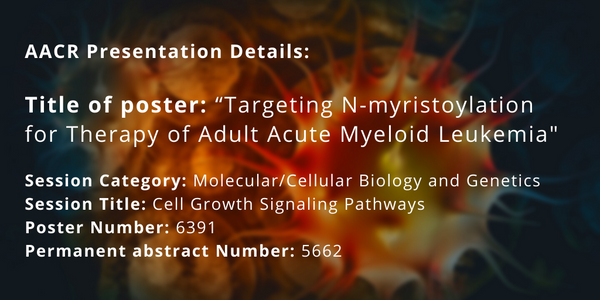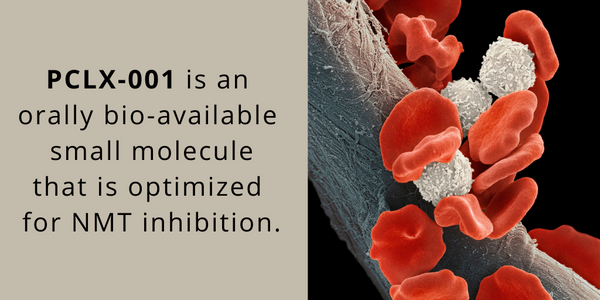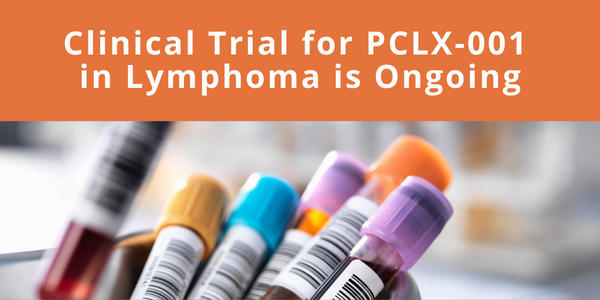Edmonton, Alberta, Canada, April 8, 2022 Pacylex today announced that data from an investigation of the potential for N-myristoylation inhibition to treat Acute Myeloid Leukemia (AML) will be presented at the American Association for Cancer Research (AACR) Annual Meeting from April 8-13, 2022. This investigation included the association of N-myristoyl transferase (NMT) expression levels with AML patient survival and the in vitro and in vivo demonstration of AML cell killing and tumor reduction with PCLX-001, a proprietary, potent, NMT inhibitor in clinical investigation in Non-Hodgkin’s Lymphoma (NHL) and solid tumor cancer patients. The poster details are below:
AACR Presentation Details:
Title of poster: “Targeting N-myristoylation for Therapy of Adult Acute Myeloid Leukemia"
Session Category: Molecular/Cellular Biology and Genetics
Session Title: Cell Growth Signaling Pathways
Poster Number: 6391
Permanent abstract Number: 5662
Poster will be available in the e-poster website starting 1pm Friday April 8th, and will remain available through Wednesday July 13th.
PCLX-001 induced apoptosis in AML cell lines and patient blasts at concentrations that spared a large proportion of peripheral blood lymphocytes and monocytes from healthy individuals. PCLX-001 monotherapy had dose-dependent anticancer activity in an AML MV-4-11 cell line derived xenograft (CDX) and two AML patient derived xenografts (PDXs) and produced complete remissions in subcutaneous AML CDX. In tail-vein injected PDX models, PCLX-001 treatment resulted in up to 95% reduction of human CD45+ cells in peripheral blood and bone marrow.
“We are building on our previous success demonstrating the efficacy of PCLX-001 in lymphoma, which has now advanced to clinical studies, and showing the same potential exists in leukemia,” said Luc Berthiaume, CSO of Pacylex. Pacylex plans to initiate a clinical investigation in AML patients later in 2022.
In the ongoing clinical study in NHL and solid tumor patients in Canada, patients have been enrolled at the University of Alberta Cross Cancer Institute, Princess Margaret Hospital in Toronto, Centre Hospitalier de l'Université de Montréal (CHUM) and are expected to be dosed at the BC Cancer Agency in Vancouver. The study will enroll 20-30 patients in the initial phase. Four principal investigators will oversee the clinical study at the four clinical sites in Canada: Dr. John Kuruvilla at Princess Margaret Cancer Centre in Toronto, Dr. Randeep Sangha at the Cross Cancer Institute in Edmonton, Dr. Laurie Sehn at the British Columbia Cancer Center in Vancouver, and Dr. Rahima Jamal at CHUM in Montreal.
This study is registered at ClinicalTrials.gov Identifier: NCT04836195.
For more information:
Pacylex Pharmaceuticals Contact: Michael J. Weickert
CEO, Pacylex Pharmaceuticals, Inc.
E: michael.weickert@pacylex.com
P: 650-218-1840
Twitter @Pacylex (https://twitter.com/pacylex)
LinkedIn (www.linkedin.com/company/pacylex-pharma)
Facebook (https://www.facebook.com/pacylex)
#cancer, #lymphoma, #leukemia, #albertacancer, #Pacylex, #PCLX001, #UAlberta; #UAlberta_FoMD; #Worldslongestgame






